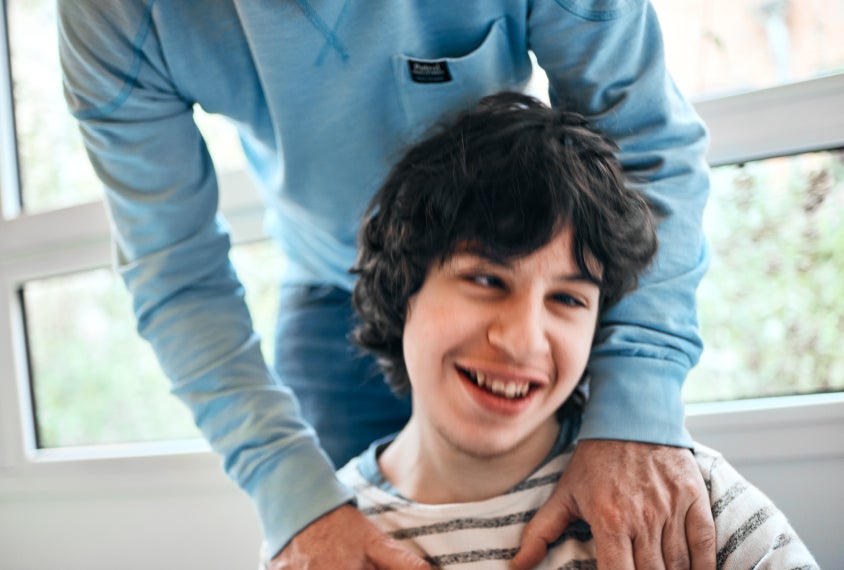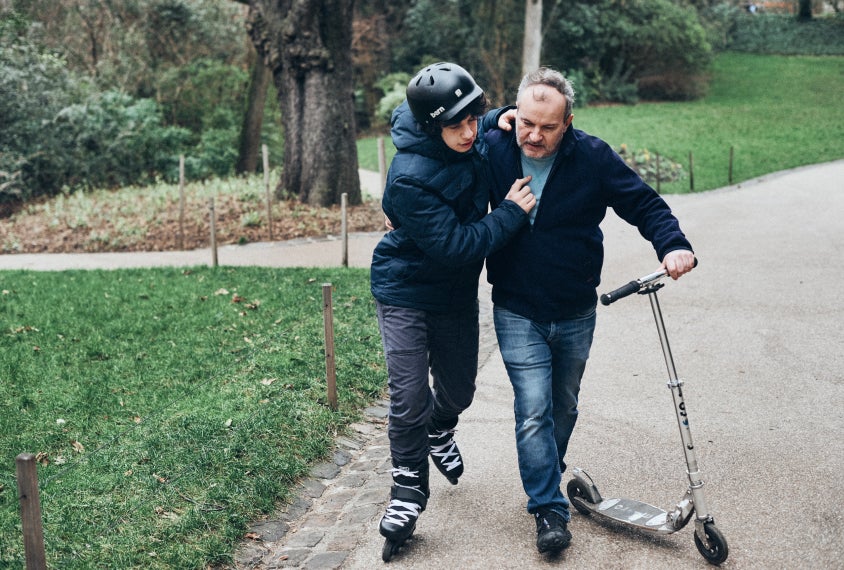More genetic testing is needed to effectively diagnose autism
DNA sequencing gave Gabin the diagnosis he needed – Marta Zaraska investigates why more of it isn't available

Gabin Savard had no words. The 2-year-old was full of energy but didn’t speak, and his parents, Marylou and Laurent, were becoming increasingly anxious. Gabin was developing more slowly than his older brother, Sébastien, had. The Savards reached for parenting books and pediatrics textbooks, but what they read only deepened their worry. They repeatedly mentioned their concerns to their paediatrician during regular checkups. “Maybe he doesn’t have anything to say?” the doctor joked, unconcerned. Laurent Savard, a well-known comedian in France, did not see the humour.
When Gabin still wasn’t speaking at nearly 4 years old, his parents decided to take him to see a child psychiatrist, who concluded that the boy has autism. The diagnosis helped to explain Gabin’s silence, but it also raised new questions: Was there anything Gabin’s parents could or should do? Would the child ever speak? What kind of progress could his parents expect?
No one seemed to have any answers for them. About a year later, still looking for help, the Savards took Gabin for an evaluation at University Hospital Robert-Debré in Paris, which specialises in rare childhood conditions. Soon after, they received a call: Would they participate in the Paris Autism Research International Sibpair (PARIS) study, an international project that recruits families for genetic testing? The Savards signed up for the study and provided many tubes of saliva and blood. And then they waited — a year, two, five. “We had almost forgotten that Gabin had participated in this study,” Laurent Savard recalls.

In 2012, the Savards finally heard from psychiatrist Richard Delorme, who oversees the project with geneticist Thomas Bourgeron. Delorme and his colleagues had sequenced and analysed every stretch of the family’s DNA and found that Gabin carries a mutation in Shank3. (Shank3 is needed for neurons to connect properly, and Bourgeron has studied it extensively.)
“I sat on the bed, wondering how to write ‘shank.’ I thought it was ‘shrank,’ with an ‘r’ like in ‘Shrek,’” Laurent says. “It was an emotional tsunami. I was both relieved and, at the same time, I took a blow to the head when Professor Delorme told me that it meant a very severe autism.”
Mutations in Shank3 are present in about 0.7 percent of all people with autism and about 2 percent of people with both autism and intellectual disability. But neither of Gabin’s parents has the mutation – meaning that it occurred spontaneously. Spontaneous mutations tend to have severe effects, and Gabin will most likely remain minimally verbal; at 16, he still speaks only a few words and cannot write or count. He is also often hyperactive and experiences motor tics. On the other hand, he is a master at roller skating, his father says.
Laurent Savard has used his celebrity to talk about his son’s autism publicly. He says other parents of autistic children often approach him for advice: For example, how did he manage to get whole-genome sequencing for his son? “It was really just luck,” he says. Gabin was at the right place at the right time: by chance visiting University Hospital Robert-Debré when the Paris study was recruiting.
In France, some two-thirds of autistic children receive some kind of genetic test, paid for by the national health service. That’s twice as many as are tested in the United States, where insurance companies typically don’t cover the cost of the tests. Most French children with autism are screened for the related fragile X syndrome or get a ‘chromosomal microarray analysis’. This latter test detects large deletions or duplications of DNA associated with autism. Some hospitals also use gene panels, particularly for children with severe traits, to look at a small subset of the 99 genes strongly tied to the condition. But these targeted tests yield results less than 30 percent of the time. And outside of a research study, few autistic children receive anything more comprehensive.
Maybe Gabin will make up for lost time … He will drown us in a stream of words. We will wake him even in the middle of the night for the sole pleasure of hearing him speak
To improve that situation, a few European governments are channelling funds towards expanding the number of genetic tests their clinics routinely offer. Had Gabin been born in the Netherlands, for instance, his doctors might have opted to sequence his exome, the protein-coding portion of his genome. “We are really in a transition phase. Rather than testing one, two, three, four genes, everyone is now switching to whole-exome sequencing,” says Ype Elgersma, professor of molecular neuroscience at Erasmus University in Rotterdam.
Likewise, France and the UK have launched ambitious plans to build sequencing facilities, create databases and integrate the results of genetic testing into standard healthcare. In October, the UK announced plans to sequence 5 million genomes within the next five years. The scope of France’s Genomic Medicine 2025 Plan is smaller, but Bourgeron says it will help build the case for regular sequencing of people’s entire genomes. Both projects may provide autistic people with more opportunities to get tested. In January, for example, 13 centres in the UK began offering whole-genome sequencing to people with cancer and unexplained conditions, including autism.

This move towards genetic testing is part of a larger shift in attitudes towards autism in Europe. About a decade ago, the continent was focused primarily on societal issues pertaining to autism, such as rights and access, says Zsuzsanna Szilvasy, president of Autism-Europe, an autism advocacy group spanning 38 countries. “Between the [United] States and Europe, there was a huge, huge difference.” Now, however, Europe is moving the spotlight onto genetic services — in part in response to parents’ demands.
As these countries scale up genetic testing for autism, their efforts could offer practical lessons to other regions. The troves of data they collect could also help scientists link more genetic variants to autism, ultimately making genetic testing more valuable for everyone.
Growing pains
In some ways, Europe has been the leader in the realm of genetic testing for autism. The European Union, along with industry and institutional partners, invested heavily in a collaboration called EU-AIMS, the largest single grant for autism research in the world. The first phase of the project, which ran from April 2012 to March 2018, sought to identify biomarkers of autism, among other goals; the next stage, AIMS-2-TRIALS, which launched in June, focuses on developing and testing therapies. “In one or two years, we will have a website with access to all the genetic information from this project,” says Bourgeron, who oversees the initiative’s genetic research.
The Council of Europe, a human-rights organisation with 47 member states, was the first in the world to write laws addressing genetic testing. That document, the Convention on Human Rights and Biomedicine, or the Oviedo Convention for short, debuted in 1997 — several years before the U.S. drafted any similar legislation. The document recognised an individual’s right to know her genetic background, banned discrimination on those grounds and introduced the right to genetic counselling.
A follow-up treaty from 2008 made several additions, including a ban on direct-to-consumer genetic testing for variants associated with health conditions. Over the past decade, 29 European countries have ratified the convention into national law, and 5 have ratified the follow-up treaty. Last year, 19 member states of the European Union signed a declaration to share genomic health data across international borders, with the goal of sequencing 1 million genomes by 2022.
We are really in a transition phase. Everyone is now switching to whole-exome sequencing
Despite those commitments, however, there are no laws that are valid throughout Europe. This lack of consistent regulations has left healthcare professionals in limbo, unsure about how to ramp up genetic testing for autism or other conditions. In Sweden — which signed the Oviedo Convention but did not ratify it — doctors in some regions order comprehensive testing and those in others, none. “It looks very different across the country,” says Kristiina Tammimies, assistant professor of neuropsychiatry at the Karolinska Institutet in Stockholm.
In Germany, too, the tests can vary depending on which lab performs the analysis. Germany’s health service pays for sequencing up to 25 kilobases, or five to seven genes, for any condition, including autism. Clinical geneticists often send blood samples to labs without specifying which genes should be tested. The labs look at thousands of genes and then suggest relevant ones to the doctors, who bill the government or health insurance for only that set. “Every diagnostic lab cooks its own soup,” says Johannes Lemke, head of Leipzig University Hospital’s Institute of Human Genetics. Any clinician wishing to have more sequenced, such as the exome or whole genome, has to apply for pre-approval, which is granted less than 10 percent of the time. “It’s almost not worth it to apply,” Lemke says.
In Austria, the government does not pay for any genetic testing for autism. “I’m contacted by many frustrated parents. They call me; they write me; they say, ‘You know, we’ve heard about genetic testing; we want to do this — if you can do this, we can pay.’ [But] I always have to decline,” says Gaia Novarino, group leader at the Institute of Science and Technology Austria. Novarino and her colleagues are trying to secure funding from the government or insurance companies to start offering genetic tests in Vienna. “The best scenario would be that any child that enters the clinic for autism diagnosis or the paediatric neuropsychiatric department would be nearly automatically sent for genetic testing,” she says. “That would be my dream.”
But the situation in Spain suggests that funding is only one obstacle. Although the Spanish government covers the cost of genetic testing for autism, only about half of autistic children are offered any test, according to a 2017 study. Of that half, only about 25 percent choose microarray analysis. This may be because few clinicians and families in Spain are aware of the tests’ benefits. Another analysis in 2017 showed that only 2.5 percent of Spanish paediatric neurologists have ordered whole-genome sequencing for a child in their care with a suspected genetic condition.
Privacy concerns
Even when clinicians and families know about the available tests and the costs are covered, they may still eschew testing because there is confusion over what to do with the results. The balance between an individual’s right to privacy and the impetus to disclose genetic results varies enormously across borders, in part thanks to cultural differences. Extreme stances on either end have dramatic consequences for how doctors and families approach genetic testing.
In the UK, the Joint Committee on Genomics in Medicine recommends that test recipients share genetic results with relatives who might benefit from knowing them – including, say, family members with a propensity for heart disease or a particular cancer. If the recipients choose not to disclose their results, the committee encourages doctors to contact family members themselves, even without their patient’s explicit consent. Many British healthcare professionals say they would prefer to preserve a patient’s confidentiality but also worry about being liable for negligence if they don’t reveal potential risks to family members.
France takes this stance one step further: According to a 2011 law, French citizens have a legal obligation to disclose any “severe genetic anomaly” associated with a serious illness to their relatives, provided preventive measures or treatment is possible. But researchers are still debating which mutations should fall under this law.
The results of genetic tests are even less private in Switzerland and the Netherlands, both of which let insurers consider this information when crafting life-insurance policies. In Norway, people with certain genetic mutations, including some associated with autism, may have to pay more for private health insurance. Although only 9 percent of parents of autistic children in that country say they are opposed to genetic testing, as much as 67 percent fear that their children could face insurance discrimination.
By contrast, Germany takes confidentiality so seriously that doctors may not discuss a child’s results even with her other doctors, without written consent from her parents. “Sometimes it’s really too restrictive for the practical workday and routine,” Lemke says. Lemke credits history – and powerful memories of Nazi eugenics during the Second World War – for Germany’s stringent laws. “We want to really make sure that it’s really strictly regulated and nothing can go wrong,” he says.

Following the Oviedo Convention, most European nations adopted laws to protect their citizens from genetic discrimination. Greece went as far as to amend its constitution to fold in clear protections. Some countries, such as France and Portugal, prohibit insurance companies from using genetic results to set premium levels. Others, such as the UK, have a ‘soft law’: Since 2001, the British government has drafted periodic guidelines on what genetic information insurance companies may request from consumers.
Room for improvement
To reap the full benefits of genetic testing, what’s needed, experts say, are more guidelines, standardisation across countries, more funding and greater awareness among healthcare professionals. There are several new initiatives in Europe that could make testing for autistic people more consistent throughout the continent.
For example, in 2013, the European Board of Medical Genetics launched a continent-wide registration system for genetic counsellors and started offering professional guidelines to its registrants. Only a few countries, such as France and Norway, already had laws regulating this kind of work, although in Germany and France, genetic counselling is routine for anyone who gets a test. (By way of comparison, in the US, only 24 percent of children diagnosed with autism see a genetic counsellor.)
The best scenario would be that any child that enters the clinic for autism diagnosis would be nearly automatically sent for genetic testing
Many genetic centres are also borrowing guidelines issued by the American College of Medical Genetics and Genomics in situations for which they have none. For instance, Lemke’s institution relies on those recommendations when deciding what to do with ‘incidental’ findings from a test — which may foretell other medical problems or indicate paternity. “We have something to rely on,” Lemke says.
In addition, the EU-funded Ithaca European Reference Network — a group of 38 accredited labs and medical centres specialising in intellectual disability and birth defects – is trying to disseminate guidelines and other resources to clinicians and families. Experts are available for consultations via telehealth systems. The network is also trying to open up access to whole-exome and whole-genome sequencing across the continent. According to Elgersma, the network is supposed to level the playing field, assuring that “if you have a rare disorder in the Netherlands that you do not have many more benefits than if you have that in Romania.”
All of these countries are being forced to reckon with the growing demand for genetic testing, much of it from parents of children with rare conditions. For Gabin, the results of his whole-genome sequence completely changed his family’s outlook on his autism. Laurent Savard says he cried after learning about his son’s mutation, but it also made him hopeful about scientific advances. “Immediately after, I read on the internet that mice with mutations in Shank3 had become typical after a molecular treatment,” he says. “I then imagined that Gabin would become typical one day, talking, telling me what he experienced on the inside.”
Savard knows there is an enormous gulf between animal studies and therapies for people, but he is still optimistic. In his 2017 book, Gabin Sans Limites (Gabin Without Limits), Savard wrote: “Maybe Gabin will make up for lost time … He will drown us in a stream of words. We will wake him even in the middle of the night for the sole pleasure of hearing him speak.”
For now, Savard is performing a standup comedy show to raise awareness about autism and the potential of genetic research. The act is called Le Bal des Pompiers after the fire-station dances that take place across France on 13 July — the night before Bastille Day and, by coincidence, Gabin’s birthday. To stand up for Gabin’s rights, he says, “humour is the best weapon”.
This article was first published on Spectrum and is republished under a Creative Commons licence
Join our commenting forum
Join thought-provoking conversations, follow other Independent readers and see their replies
Comments